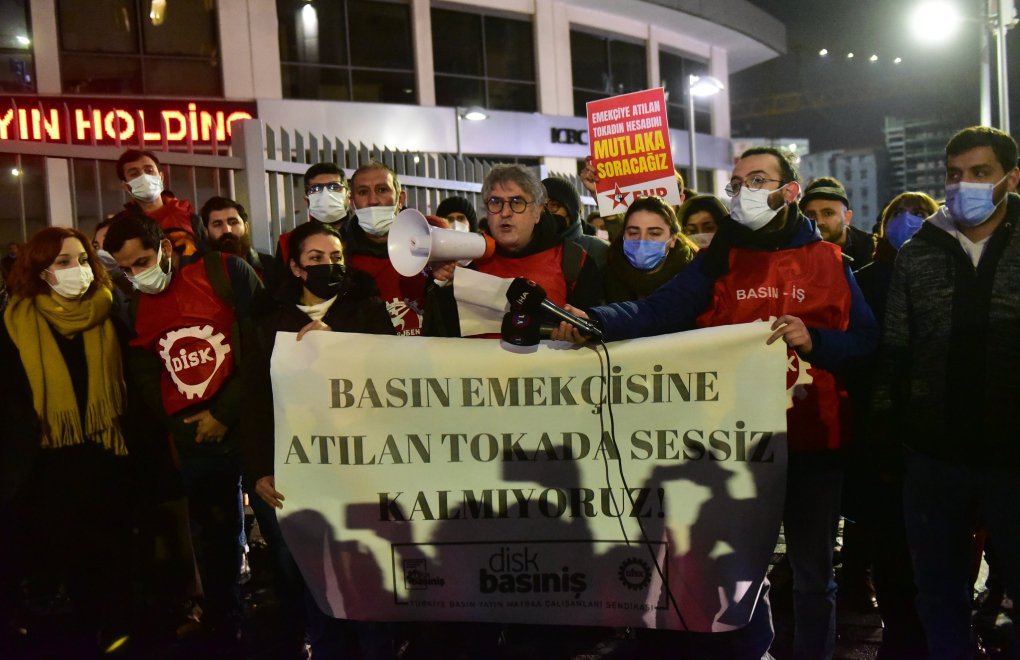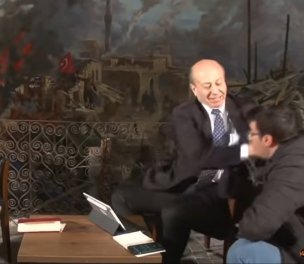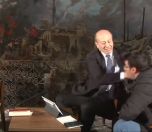* Photo: Zeynep Kuray
Click to read the article in Turkish (1) (2)
Journalists protested Habertürk's Muharrem Sarıkaya for slapping İhlas News Agency (İHA) reporter Ahmet Demir in the face on a live broadcast. Led by their union, they gathered in front of the Habertürk media outlet's office in İstanbul's Taksim yesterday evening (December 20).
Organizing the protest, the Confederation of Progressive Trade Unions of Turkey (DİSK) Press Laborers Union opened a banner of "We don't stay silent in the face of the slap given to the press laborer."
Speaking during the protest, union chair Faruk Eren said, "The slap in the face of laborers cannot be forgiven," adding, "With that slap, what the abnormal egos who find it normal to get above themselves by leaning on power have been doing to all of us for years has become visible."
Defining Sarıkaya's slap as "a concrete indication of the mindset trying to discipline journalists through the hardships in making ends meet", Eren said, "That slap is a continuation and a repetition of the government's practices trying to intimidate journalists with prison and fines."
Eren recalled that several other journalists have announced that Sarıkaya has been mistreating them as well. He said, "The ones who lean on power holders and rulers openly torment press laborers and one usually stays silent in the face of these torments, fearing a job loss."
Call to professional organizations
Faruk Eren noted that though Muharrem Sarıkaya resigned from office as the Ankara Representative of Habertürk, it is not clear whether he still works for the newspaper and the TV channel. He called on the Habertürk executives to relieve Sarıkaya of all his duties at Habertürk.
Addressing the professional organizations where Sarıkaya is a member, Faruk Eren also said, "What we expect from them is that they do not tolerate this lumpen attitude and end all his memberships."
Concluding his remarks, Faruk Eren recalled that there are also journalists who are subjected to violence but cannot speak up:
May no one remain silent from now on; let's speak up together. Let's speak up in an organized manner. Turkey is talking about a new era. We see its effects on the media. Let's not forget this: The new media should not proceed with the habits of the old. All journalists and press laborers in the media must be organized. Press laborers, all press forces and the people who want democracy will whip through the ones who will attempt to hinder this.
Sarıkaya referred to honor board
Shortly after this statement was made, the Turkish Journalists' Association (TGC) has announced that it has referred its member Muharrem Sarıkaya to the TGC Honor Board considering that his action was against the TGC By-law, the Declaration of Rights and Responsibilities of Journalists of Turkey as well as professional dignity and honor.
The TGC has unanimously decided to launch a disciplinary investigation against the journalist, to ask for his defense and to refer him to the TGC Honor Board after his defense is taken as part of the inquiry.
What happened?
Muharrem Sarıkaya, the Ankara representative of Habertürk, slapped İhlas News Agency (İHA) reporter Ahmet Demir in the face while interviewing Fatma Şahin, the Metropolitan Mayor of Antep from the ruling Justice and Development Party (AKP) on Friday (December 17).
Amid public outrage over the incident, Sarıkaya first apologized for his behavior, then announced his resignation on Twitter:
"I apologize to the entire public who reacted against the incident and to my colleagues and family for making them go through such an incident. As of today, I have resigned from office as the Ankara Representative of the Ciner Media Group. Yours respectfully," he has written on his Twitter account.
In the video footage posted the day before (December 19), it is seen that Muharrem Sarıkaya slapped reporter Ahmet Demir, who was trying to solve the problem with the phone and cables during the broadcast.
Later in the video, Sarıkaya is seen to be asking for something from the ones around him while Mayor Fatma Şahin remains unresponsive and continues speaking to Sarıkaya as part of the interview.
Several press and labor organizations denounced Muharrem Sarıkaya's behavior against İHA reporter Ahmet Demir.
(HA/SD)






